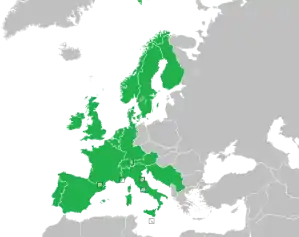Eurovision Song Contest 1966
The Eurovision Song Contest 1966 was the 11th edition of the annual Eurovision Song Contest. It took place in Luxembourg City, Luxembourg, following France Gall's win at the 1965 contest in Naples, Italy with the song "Poupée de cire, poupée de son". It was the second time Luxembourg hosted the event after the 1961 edition. The contest was held at the Villa Louvigny on Saturday 5 March 1966 and was hosted by Josiane Chen.
| Eurovision Song Contest 1966 | |
|---|---|
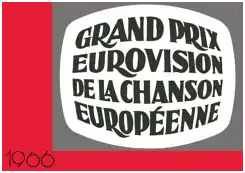 | |
| Dates | |
| Grand final | 5 March 1966 |
| Host | |
| Venue | Villa Louvigny Luxembourg City, Luxembourg |
| Presenter(s) | Josiane Shen |
| Musical director | Jean Roderès |
| Directed by |
|
| Executive supervisor | Clifford Brown |
| Host broadcaster | Compagnie Luxembourgeoise de Télédiffusion (CLT) |
| Interval act | Les Haricots Rouges |
| Website | eurovision |
| Participants | |
| Number of entries | 18 |
| Debuting countries | None |
| Returning countries | None |
| Non-returning countries | None |
Participation map
| |
| Vote | |
| Voting system | Ten-member juries awarded points (5, 3 and 1) to their three favourite songs. |
| Nul points | |
| Winning song | "Merci, Chérie" |
Eighteen countries participated in the contest. All countries that took part in the 1965 edition, also took part this year.
The winner was Austria with the song "Merci, Chérie", performed and composed by Udo Jürgens, and written by Jürgens and Thomas Hörbiger.[1] This was Austria's first victory - and Udo Jürgens third consecutive entry - in the contest. This was also the first winning song to be performed in German. This contest is also noted for its historic results for several countries. Austria who came first, Sweden who came second, Norway who came third and Belgium who came fourth all achieved their best results up until then, some of which would stand for several decades. In contrast traditional Eurovision heavyweights up to that point such as France, United Kingdom and Italy all achieved by their worst result by far up till that point, with the general public in the aforementioned countries meeting these results with a degree of consternation.
The rule stating that a country could only sing in any of its national languages was originally created in this year, possibly due to the 1965 edition's Swedish entry which was sung in English.[2]
Location
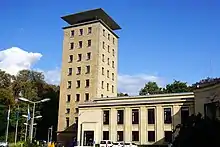
The 1966 Eurovision Song Contest was hosted in Luxembourg City. The venue chosen to host the 1966 contest was the Villa Louvigny, which also hosted the Eurovision Song Contest 1962. The building served as the headquarters of Compagnie Luxembourgeoise de Télédiffusion, the forerunner of RTL Group. It is located in Municipal Park, in the Ville Haute quarter of the centre of the city.
Format
During the voting process, the presenter (Josiane Chen) accidentally greeted United Kingdom by saying "Good night, London". She then realized her mistake and said "Good evening, London", after Michael Aspel, who was the spokesperson for the United Kingdom, at that time, responded by saying "Good morning, Luxembourg".
1966 marked the year the first ever black singer graced the Eurovision stage, Milly Scott representing the Netherlands. She was also the first singer to use a portable microphone. This was the last contest that Denmark participated in until 1978, more than a decade later.[2]
It was also one of the first contests in which an entry was not accompanied by an orchestra. The Italian entry "Dio, come ti amo" performed by Domenico Modugno had been rearranged since its performance at the Sanremo Music Festival and officially broke the EBU rule that stated the arrangement should be finalised well in advance. During the Saturday afternoon rehearsal Modugno performed the new arrangement with three of his own musicians as opposed to the orchestra, which went over the three minute time limit. Following his rehearsal Modugno was confronted by the show's producers about exceeding the time limit and was asked to use the original arrangement with the orchestra. Modugno was so dissatisfied with the orchestra that he threatened to withdraw from the Contest. Both the producers and EBU scrutineer Clifford Brown felt it was too short notice to fly Gigliola Cinquetti to Luxembourg to represent Italy, so the EBU gave in and allowed Modugno to use his own ensemble instead of the orchestra. Despite websites and the official programme listing Angelo Giacomazzi as the conductor, Giacomazzi actually played the piano for the entry.[3][4]
This year's voting was also characterised with numerous cases of "neighbourly" or "bloc" voting - a problem that would plague the contest in many future decades. Sweden for example received all its 16 points, bar one, from its Nordic neighbours - as did Finland. Denmark likewise received all its points from Nordic nations. The voting of the Nordic countries was met with booing from the Luxembourg audience. Portugal and its sole neighbour Spain exchanged maximum five points, with Switzerland and Austria - also two countries neighbouring each other - doing likewise. France was spared the indignity of no points from its micro-state neighbour Monaco. Ireland awarded maximum points to its culturally closest neighbour the United Kingdom with the Netherlands doing the same for Belgium.
Participating countries

All countries which participated in the 1965 contest returned for a second consecutive year.[2]
Conductors
Each performance had a conductor who was maestro of the orchestra.[3][5]
 Germany – Willy Berking
Germany – Willy Berking Denmark – Arne Lamberth
Denmark – Arne Lamberth.svg.png.webp) Belgium – Jean Roderès
Belgium – Jean Roderès Luxembourg – Jean Roderès
Luxembourg – Jean Roderès.svg.png.webp) Yugoslavia – Mojmir Sepe
Yugoslavia – Mojmir Sepe Norway – Øivind Bergh
Norway – Øivind Bergh Finland – Ossi Runne
Finland – Ossi Runne Portugal – Jorge Costa Pinto
Portugal – Jorge Costa Pinto Austria – Hans Hammerschmid
Austria – Hans Hammerschmid Sweden – Gert-Ove Andersson
Sweden – Gert-Ove Andersson.svg.png.webp) Spain – Rafael Ibarbia
Spain – Rafael Ibarbia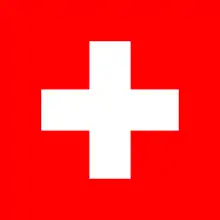 Switzerland – Jean Roderès
Switzerland – Jean Roderès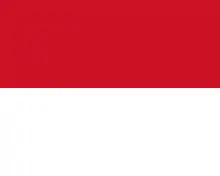 Monaco – Alain Goraguer
Monaco – Alain Goraguer Italy – Angelo Giacomazzi
Italy – Angelo Giacomazzi France – Franck Pourcel
France – Franck Pourcel Netherlands – Dolf van der Linden
Netherlands – Dolf van der Linden Ireland – Noel Kelehan
Ireland – Noel Kelehan United Kingdom – Harry Rabinowitz
United Kingdom – Harry Rabinowitz
Returning artists
Two artists returned for a third time in this year's contest. Udo Jürgens from Austria whose previous participations were in 1964 and 1965; and Domenico Modugno from Italy, who last participated in 1958 and 1959.
Results
Scoreboard
| Voting results | ||||||||||||||||||||
|---|---|---|---|---|---|---|---|---|---|---|---|---|---|---|---|---|---|---|---|---|
| Germany | 7 | 1 | 5 | 1 | ||||||||||||||||
| Denmark | 4 | 1 | 3 | |||||||||||||||||
| Belgium | 14 | 5 | 3 | 1 | 5 | |||||||||||||||
| Luxembourg | 7 | 1 | 5 | 1 | ||||||||||||||||
| Yugoslavia | 9 | 3 | 1 | 5 | ||||||||||||||||
| Norway | 15 | 1 | 3 | 3 | 3 | 5 | ||||||||||||||
| Finland | 7 | 3 | 3 | 1 | ||||||||||||||||
| Portugal | 6 | 1 | 5 | |||||||||||||||||
| Austria | 31 | 5 | 5 | 5 | 1 | 1 | 3 | 5 | 3 | 3 | ||||||||||
| Sweden | 16 | 5 | 5 | 5 | 1 | |||||||||||||||
| Spain | 9 | 1 | 5 | 3 | ||||||||||||||||
| Switzerland | 12 | 1 | 5 | 3 | 3 | |||||||||||||||
| Monaco | 0 | |||||||||||||||||||
| Italy | 0 | |||||||||||||||||||
| France | 1 | 1 | ||||||||||||||||||
| Netherlands | 2 | 1 | 1 | |||||||||||||||||
| Ireland | 14 | 3 | 3 | 5 | 3 | |||||||||||||||
| United Kingdom | 8 | 3 | 5 | |||||||||||||||||
5 points
Below is a summary of all 5 points in the final:
| N. | Contestant | Voting nation |
|---|---|---|
| 4 | Austria | Belgium, Luxembourg, Monaco, Yugoslavia |
| 3 | Sweden | Denmark, Finland, Norway |
| 2 | Belgium | Germany, Netherlands |
| 1 | Germany | Switzerland |
| Ireland | France | |
| Luxembourg | Sweden | |
| Norway | Italy | |
| Portugal | Spain | |
| Spain | Portugal | |
| Switzerland | Austria | |
| United Kingdom | Ireland | |
| Yugoslavia | United Kingdom |
Broadcasters, commentators and spokespersons
Spokespersons
Listed below is the order in which votes were cast during the 1966 contest along with the spokesperson who was responsible for announcing the votes for their respective country.[8]
 Germany – Werner Veigel
Germany – Werner Veigel Denmark – Claus Toksvig
Denmark – Claus Toksvig.svg.png.webp) Belgium – André Hagon
Belgium – André Hagon Luxembourg – Camillo Felgen (Luxembourgish representative in 1960 and 1962)
Luxembourg – Camillo Felgen (Luxembourgish representative in 1960 and 1962).svg.png.webp) Yugoslavia – Dragana Marković
Yugoslavia – Dragana Marković Norway – Erik Diesen
Norway – Erik Diesen Finland – Poppe Berg
Finland – Poppe Berg Portugal – Maria Manuela Furtado
Portugal – Maria Manuela Furtado Austria – Walter Richard Langer
Austria – Walter Richard Langer Sweden – Edvard Matz[9]
Sweden – Edvard Matz[9].svg.png.webp) Spain – Margarita Nicola
Spain – Margarita Nicola Switzerland – Alexandre Burger
Switzerland – Alexandre Burger Monaco – TBC
Monaco – TBC Italy – Enzo Tortora
Italy – Enzo Tortora France – Jean-Claude Massoulier[10]
France – Jean-Claude Massoulier[10] Netherlands – Herman Brouwer[11]
Netherlands – Herman Brouwer[11] Ireland – Frank Hall
Ireland – Frank Hall United Kingdom – Michael Aspel[3]
United Kingdom – Michael Aspel[3]
Broadcasters and commentators
Each national broadcaster also sent a commentator to the contest, in order to provide coverage of the contest in their own native language.
| Country | Broadcaster(s) | Commentator(s) | Ref(s) | |
|---|---|---|---|---|
| Participating countries | ||||
| ORF | Willy Kralik | |||
| RTB | French: Paule Herreman | [8] | ||
| BRT | Dutch: Herman Verelst | [8] | ||
| DR TV | Skat Nørrevig | |||
| TV-ohjelma 1 and Yleisohjelma | Aarno Walli | [8] | ||
| Première Chaîne ORTF | François Deguelt | [8][12] | ||
| Deutsches Fernsehen | Hans-Joachim Rauschenbach | [8] | ||
| Telefís Éireann | Brendan O'Reilly | [8] | ||
| Radió Éireann | Kevin Roche | |||
| Secondo Programma | Piero Angela | [8] | ||
| Télé-Luxembourg | Jacques Navadic | [8][12] | ||
| Télé Monte Carlo | François Deguelt | |||
| Nederland 1 | Teddy Scholten | [8][13] | ||
| NRK and NRK P1 | Sverre Christophersen | [8] | ||
| RTP | Henrique Mendes | [8] | ||
| TVE | Federico Gallo | [8] | ||
| Sveriges TV and SR P1 | Sven Lindahl | [8][14] | ||
| TV DRS | German: Theodor Haller | |||
| TSR | French: Georges Hardy | [8] | ||
| TSI | Italian: Giovanni Bertini | |||
| BBC1 | David Jacobs | [8][3] | ||
| BBC Light Programme | John Dunn | |||
| Televizija Beograd | Serbo-Croatian: Miloje Orlović | |||
| Televizija Zagreb | Serbo-Croatian: Mladen Delić | |||
| Televizija Ljubljana | Slovene: Tomaž Terček | |||
| Non-participating countries | ||||
| ČST | Unknown | [3] | ||
| Deutscher Fernsehfunk | Unknown | [3] | ||
| RTV | Unknown | [3] | ||
| TVM | Unknown | [3] | ||
| TVP | Unknown | [3] | ||
| TVR | Unknown | [3] | ||
| CT USSR | Unknown | [3] | ||
References
- "About Udo Jürgens". EBU.
- "Eurovision Song Contest 1966". EBU. Retrieved 14 June 2012.
- Roxburgh, Gordon (2012). Songs for Europe: The United Kingdom at the Eurovision Song Contest. Volume One: The 1950s and 1960s. Prestatyn: Telos Publishing. pp. 407–417. ISBN 978-1-84583-065-6.
- Angelo Giacomazzi bio at www.andtheconductoris.eu
- "And the conductor is..." Retrieved 10 July 2018.
- "Eurovision Song Contest 1966". The Diggiloo Thrush. Retrieved 4 March 2012.
- "Eurovision Song Contest 1966". 4Lyrics.eu. Retrieved 16 September 2020.
- "Eurovision 1966 - Cast and Crew". IMDb. Retrieved 18 July 2020.
- "Infosajten.com". Infosajten.com. Archived from the original on 18 July 2012. Retrieved 10 August 2012.
- Deguelt, François et al. (5 March 1966). 11ème Concours Eurovision de la Chanson 1966 [11th Eurovision Song Contest 1966] (Television production). Luxembourg: RTL, ORTF (commentary).
- "Teddy Scholten geeft commentaar op het Eurovisie Songfestival", Limburgsch Dagblad, 25 February 1966
- Christian Masson. "1966 – Luxembourg". Songcontest.free.fr. Retrieved 10 August 2012.
- "Nederlandse televisiecommentatoren bij het Eurovisie Songfestival". Eurovision Artists (in Dutch).
- Thorsson, Leif (2006). Melodifestivalen genom tiderna ["Melodifestivalen through time"]. Stockholm: Premium Publishing AB. p. 60. ISBN 91-89136-29-2.
External links
| Wikimedia Commons has media related to Eurovision Song Contest 1966. |
